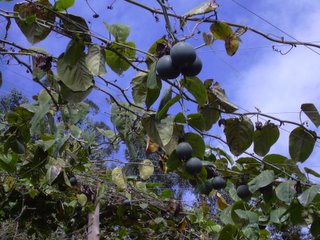
Thoughts of home are peppered with a longing for familiar things, a system I understand, and a feeling of belonging. Being away from home truly makes you cherish what you have, where you live, and the people that make it feel like 'home'; it is always upon returning that I can fully grasp the experience of traveling, and can see how it has affected me. It is this process that makes traveling feel so good: learning about yourself simply by gaining an understanding of a culture and land that is unknown, in an often uncomfortable and stressful context, where some days all you want is some peace and quiet, a respite from the obnoxiously loud bus and truck traffic, honking taxis, and never-ending 'ecua-beat' heard on every block, everyday and night. When you can just walk into a store and buy something without being ignored or pushed out of the way by an Ecuadorian who is uncharacteristically in a hurry. These are the moments when traveling is anything but glamorous.
But I digress. What I wanted to ponder here wasn't the not-so-nice aspects of a developing Latin American country, but the so wonderfully positive things that I can't let myself forget.
The Latin American system of small shops is both mind-boggling and refreshing; there must be at least 2 or 3 on average per block here in Tena. I can't get my mind around either the economics or the business strategies of these shops, mainly because they are so numerous, all sell the same things, and what's more, all seem to charge the same price. I personally love it because if I run out of something while cooking, it is guaranteed that I'll find it within minutes, and I don't have to be concerned with bargain shopping.
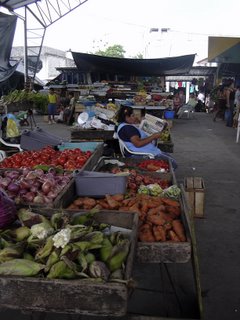 And speaking of bargains, nearly everything in Ecuador is cheap. It's all relative, of course, but everything is, generally speaking, about 5 times cheaper than in the states. I can eat on about 2.50 per day here, doing my own cooking. Because Ecuadorian cuisine isn't exactly inspiring, I find that it's healthier, safer, and cheaper to cook at home. The produce here, depending on where you are, is amazing. Here in the jungle, some things are hard to find, like spinach, lettuce, etc., crops that like it on the cooler side, but even so, you can't complain when you can buy 3 mangoes or 2-3 avocadoes (big ones!) for a dollar. Today I visited the market and bought the following for about $7.00: 5 tomatoes, 3 onions, 2 heads of garlic, 2 chili peppers, 3 mangoes, 2 avocadoes, 6 granadillas (also called 'snot fruit' or 'frog egg fruit', member of the passionflower family, tastes amazing, much better than the name implies), cilantro, 5 limes, 1 cucumber, 1 bell pepper,1 pound of rice, 1 pound of pasta, laundry/dish soap, and chicken stock. Even when it's not full on market day, the produce is still awesome. The market ladies compete for your business, but I often try to just spread the wealth unless one stand has an irresistible selection. I love the market ladies, and have actually learned a lot about produce and Ecuador by talking with them. They almost always give me free tangerine or something when I buy a lot.
And speaking of bargains, nearly everything in Ecuador is cheap. It's all relative, of course, but everything is, generally speaking, about 5 times cheaper than in the states. I can eat on about 2.50 per day here, doing my own cooking. Because Ecuadorian cuisine isn't exactly inspiring, I find that it's healthier, safer, and cheaper to cook at home. The produce here, depending on where you are, is amazing. Here in the jungle, some things are hard to find, like spinach, lettuce, etc., crops that like it on the cooler side, but even so, you can't complain when you can buy 3 mangoes or 2-3 avocadoes (big ones!) for a dollar. Today I visited the market and bought the following for about $7.00: 5 tomatoes, 3 onions, 2 heads of garlic, 2 chili peppers, 3 mangoes, 2 avocadoes, 6 granadillas (also called 'snot fruit' or 'frog egg fruit', member of the passionflower family, tastes amazing, much better than the name implies), cilantro, 5 limes, 1 cucumber, 1 bell pepper,1 pound of rice, 1 pound of pasta, laundry/dish soap, and chicken stock. Even when it's not full on market day, the produce is still awesome. The market ladies compete for your business, but I often try to just spread the wealth unless one stand has an irresistible selection. I love the market ladies, and have actually learned a lot about produce and Ecuador by talking with them. They almost always give me free tangerine or something when I buy a lot. 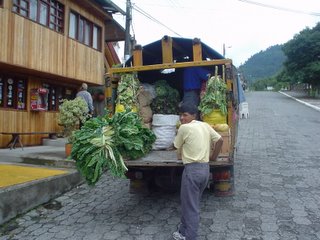
This is going to sound really silly, but I also love the dogs here. They are so truly free. Most have homes, but they really just do what they wish, roaming the streets, often congregating at the meat shop to drool and hopefully catch a scrap or bone. We’ve managed to name many of them: Ramon’s friend (see post titled ‘Ramon’ in my archives) lives kitty-corner from us; Hang-Ten on the roof across the street; Fluffy 1 and 2 live just down the block; Socks lives at the end of the block; Penny lives near the panaderia (bakery); Orejas (ears [2 inches of dog, 6 inches of ears, feared by dogs of all sizes]) lives near the river; and last but not least, 2-face lives directly across the street on the ground floor. He is my favorite, some sort of pit-bull/terrier type mix, huge and white with markings on his face, one side being mostly black with some brown, and the other white, hence our name for him. Turns out his real name is “Pirata”, or Pirate, also fairly descriptive.
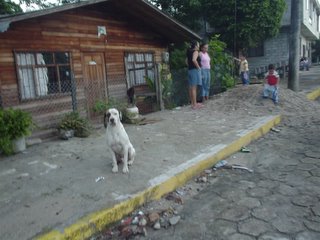
It isn’t his looks that win me over, but his personality. This dog has some character. He sits around, looking so serious and pensive, usually inside of his 9’ tall concrete/iron fence with spikes on top. One day, I saw him approach the fence from the outside, and launch himself onto it, clinging onto it halfway up, then climb the rest of the way, up and over the top. He looked like a cat! But he must weigh in at least 70 lbs.! It was impressive. We told our friend Matt, who lives below us about seeing this little feat, and he says “Oh yeah, he does it all the time. You gotta watch out for that dog, he’s strange.” He then proceeded to tell us about the time he saw a bus stop on the corner, the door open, and 2-face get off the bus. ALONE. No owner, just the dog. Somehow that freaked Matt out, but I tell you, I never laughed so hard. Many questions came to mind, the obvious ones, like how in the heck did he end up on the bus in the first place? How did he explain where he was going or know which bus to choose? Furthermore, how did he tell the driver it was his stop coming up? I mean, did he say “Gracias” like everyone else? And how on earth did he pay the fare?! The mental image of this whole scenario is almost too much.
His owner told me that jumping the fence is how he comes and goes; I wonder if she knows about the bus rides?
Anyway, the dogs are an aside, but honestly they have made my stay in Ecuador quite entertaining. They aren’t like American dogs—they’re street smart, independent, and really don’t like your attention. They are in some way more wild, not so domesticated. It’s quite refreshing, really.
I'm off on one tangent after another, my head spinning as I try to process what the past 2 months has meant to me, something that may be impossible to sort out while still living in this culture. My title was meant to refer to the abundance of produce, food, water, and life in Ecuador. The tremendous diversity that seems never-ending, but in reality is threatened all because it is cheap, plentiful, and good. My intent was to dive into the positives so that my mind would be open to the possibilities that exist here for me to thrive. In doing so, however, I can't be so discriminating. For every yummy granadilla that comes off the vine, every fresh banana I eat, there is a price, though minute in monetary terms for the consumer, it tremendously impacts ecuadorian livelihood. Rainforest is cut down at alarming rates; coming from a logging town in Idaho, I am no stranger to large-scale harvesting. The chainsaws they sell here are HUGE, indicative of the size of the native trees being cut down, all to grow bananas and coffee for export, even when it is well-documented that coffee grows much better in it's shady native understory. The precious rivers, a source of life and sustenance for so many Ecuadorians, are being damned and mined, we see it happening in front of our apartment. Digging for sand and gravel to build roads, in the name of development and modernization. The oil pipeline between here and Quito bursts and leaks, polluting the rivers and streams, all so we, in the US can drive, drive, drive...to where and why, I'm not even really sure.
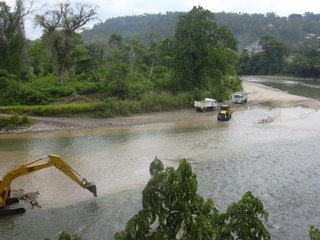
It's all easy to see from an outsider's perspective, the red flags that mark their "progress", because my own country, as well as other developed nations, has gone through the same process. I can hardly compare Latin America with the states, but economically and culturally speaking, many countries here are trying to attain a way of life that seems superior to their own. They want what they see on american TV, at the cost of their environment, health, integrity, and rich cultural history. It is a complex web of peer pressure, driven by the ever intensifying global economy, and steadily increasing greed and materialism that is spreading like no virus ever could. And unlike other viruses, isn't being fought, but perpetuated, marketed to the point that I believe no culture is unaffected.
Who am I to say what is right and wrong about how different societies choose to operate? It would be terribly judgmental of me to think that there is a right way or a wrong way, or to say that Latin America shouldn't try to achieve economic success, when they are every bit as entitled as any other country in the world. I suppose the difficulty comes in having to sit back and watch it happen, when you feel you can see that the path they are headed down will probably only lead to more disparity, inequality and lower quality of life, once they export all of their 'assets', meaning their natural resources, away.
What started as a light-hearted commentary on the great things about Ecuador has turned into much more than that. Funny how simply thinking of abundance and life led me to consider the cost of enjoying it. But, even so, I still feel better about buying my food here straight from the Quechua growers, the market ladies, knowing that there is no middle man involved, that I am supporting their community and contributing in some way to a lifestyle I will always respect more than anything else in this world. A lifestyle where there is fresh food on the table, where the farmer grows more than one crop, honoring and modeling nature's ways with diverse farms that aren't too sprawling and never corporate. A life that can be simple, where kids still play outside, where the even the dogs enjoy a sense of freedom, and one knows where their food comes from. A life where the things that really matter--culture, family, living in the moment--are, and hopefully will remain, plentiful, cheap, and good.
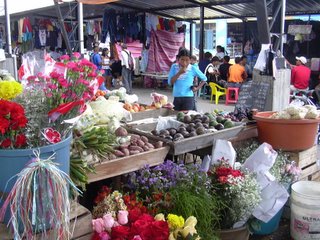
Photos, top to bottom: Granadillas on the vine; Market Lady; Abundance in Baeza; 2-Face; River Gravel Mining; Young girl at Market; Ecuadorian Daycare
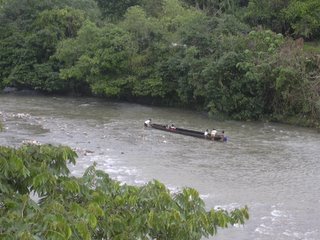
No comments:
Post a Comment